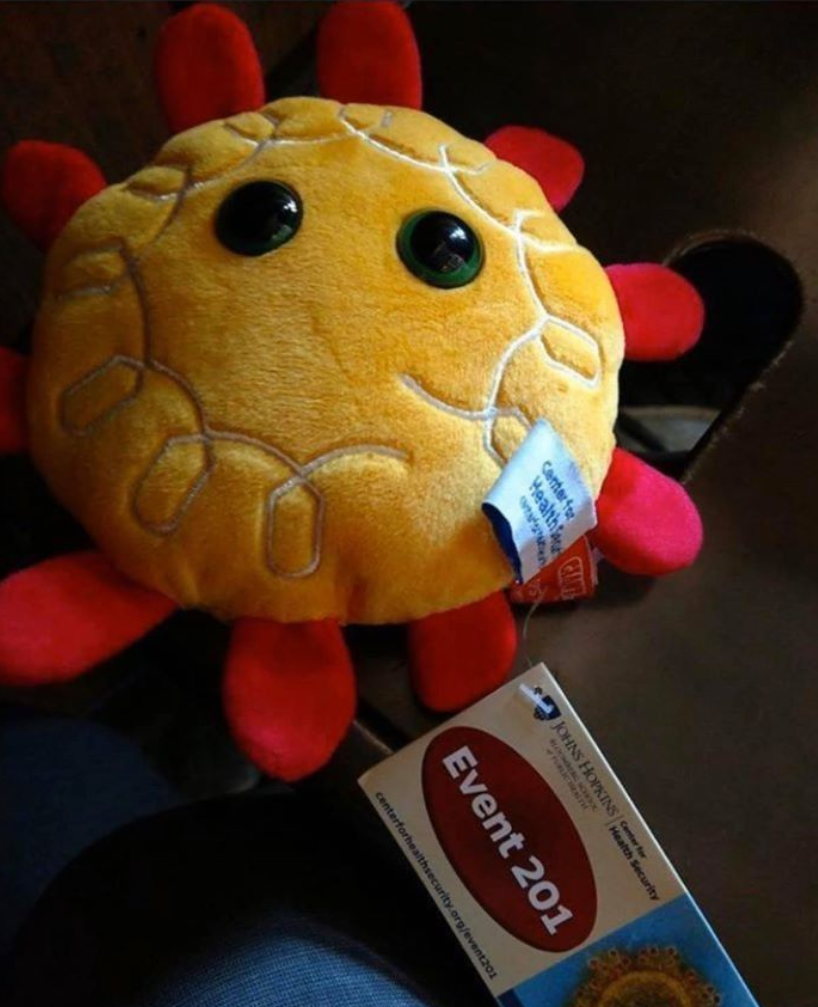It may sound like something from a sensational tabloid headline, but world leaders really did meet in October 2019 – a couple of months before the first Covid-19 case was diagnosed – to simulate a worldwide coronavirus pandemic, complete with mock news reports and panel discussions on how to impose measures such as travel restrictions, business shutdowns, and internet censorship.
The exercise was called Event 201, and organizers included Johns Hopkins Center for Health Security (JHCHS), the World Economic Forum, and the Bill and Melinda Gates Foundation. According to JHCHS:
“Event 201 simulates an outbreak of a novel zoonotic coronavirus transmitted from bats to pigs to people that eventually becomes efficiently transmissible from person to person, leading to a severe pandemic. The pathogen and the disease it causes are modeled largely on SARS…”
The World Economic Forum has posted numerous videos describing the event in which “[o]rganizers invented a disease [called CAPS]. Mocked-up news reports predicted the effects of an outbreak… As leaders from business, governments and healthcare came together… the issues, decisions and consequences were analysed… Participants agreed on a need to focus on the wide-ranging impact on people’s lives and the role for business to protect jobs, health and the economy…”

Participants included representatives from the World Bank, Marriott International, the scandal-ridden Australian ANZ Bank, Johnson & Johnson, NBC Universal Media, Lufthansa Group Airlines, and many other influential leaders. Johns Hopkins even provided a souvenir coronavirus plushy as a memento of the event.
“Tabletop” exercises like this are ostensibly held to ensure that national leaders will act cooperatively in the event of an emergency. Under the direction of global leaders, national decision-makers coordinate their responses in advance, so that when a crisis occurs, they can quickly implement plans that they have all agreed to ahead of time. Speaking after the event in March 2020, Ryan Morhard of the World Economic Forum explained:
“[I]f we are going to get ready, we need to have operationalized and integrated public-private cooperation that we haven’t seen before … and mobilize cooperation and support for the COVID-19 response.”
Unfortunately, this means that when presented with a crisis, government and industry leaders are under intense pressure to act in unison and follow through with these predetermined plans, even if real-life data does not support the preplanned response.
For instance, at Event 201, the fictional coronavirus in the exercise killed 65 million people in 18 months. JHCHS strongly clarified that the imaginary scenario was not a prediction of real-world fatality rates and that modeling inputs (illness severity, transmission rates, etc.) did not resemble actual Covid-19 numbers. Yet when a coronavirus pandemic was declared just a few months later, participants readily helped implement policies that had been recommended at the role-playing exercise – even though the impact of Covid-19 was far milder than that of the mock virus. (As of mid-March 2021, 15 months after the first Covid-19 diagnosis, the number of deaths worldwide was reported to be 2.67 million – a small fraction of the 65 million deaths from the fictional virus. And since that 2.67 million includes untold numbers of deaths from flu, heart attack, stroke, car accidents, and other causes, the real death toll from Covid-19 is much lower than that.)
The bottom line: in October 2019, the World Economic Forum and the Bill and Melinda Gates Foundation co-hosted Event 201, where world leaders planned their collective responses to a simulated worldwide coronavirus pandemic, including lockdowns, travel restrictions, business closures, and social media censorship – unprecedented measures that were carried out in real life just a few months later.
____________________
Extras:
Event 201 – Intro session:
Event 201 – Mock news report about the importance of controlling social media “disinformation”:
From the video above: “[I]t is clear countries need to make strong efforts to manage both mis- and disinformation… If the solution means controlling and reducing access to information, I think it’s the right choice.”
Event 201 – Segment 4 (final session): discussion on how best to control or censor information on social media:
Event 201 – Epilogue: